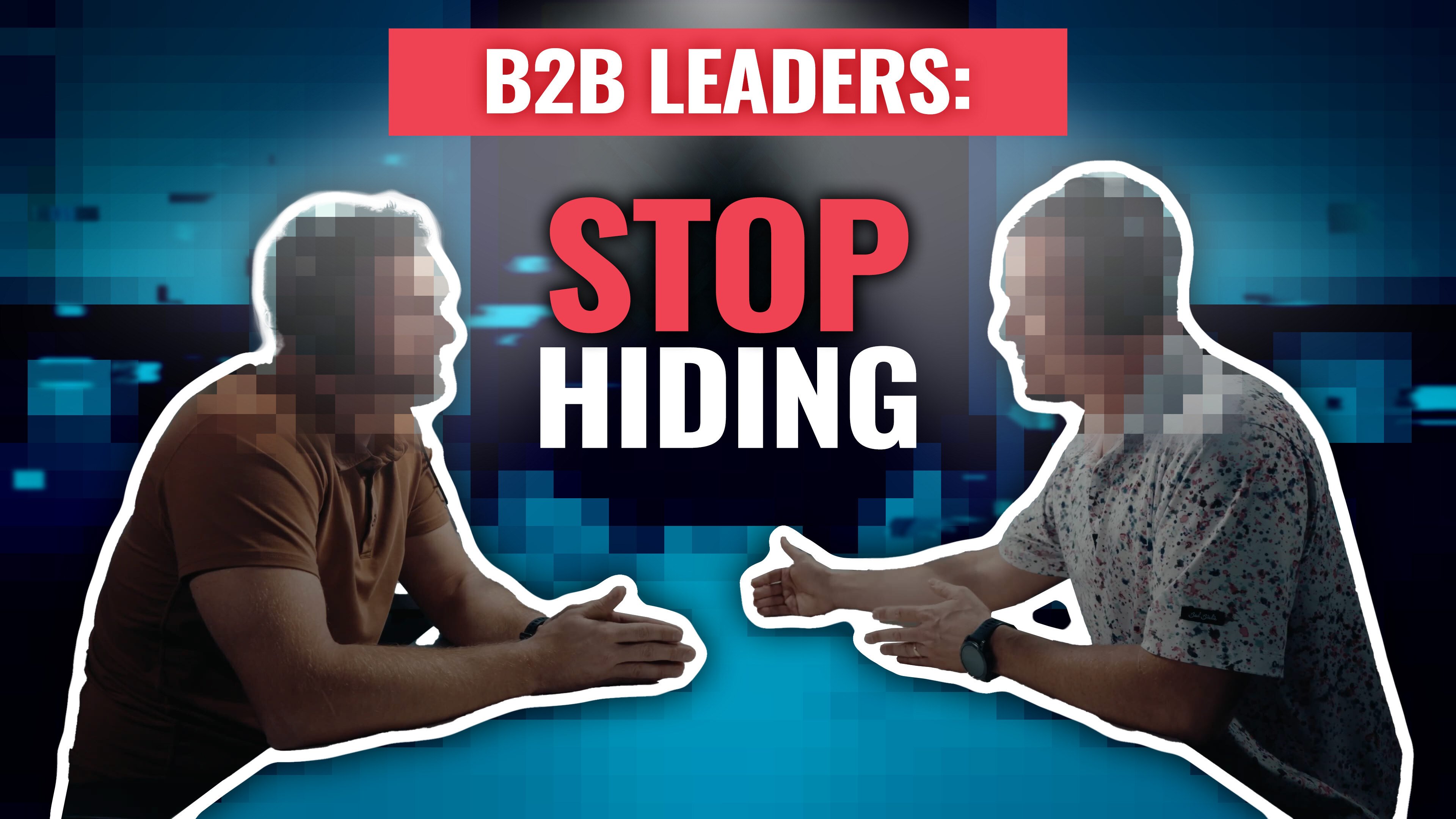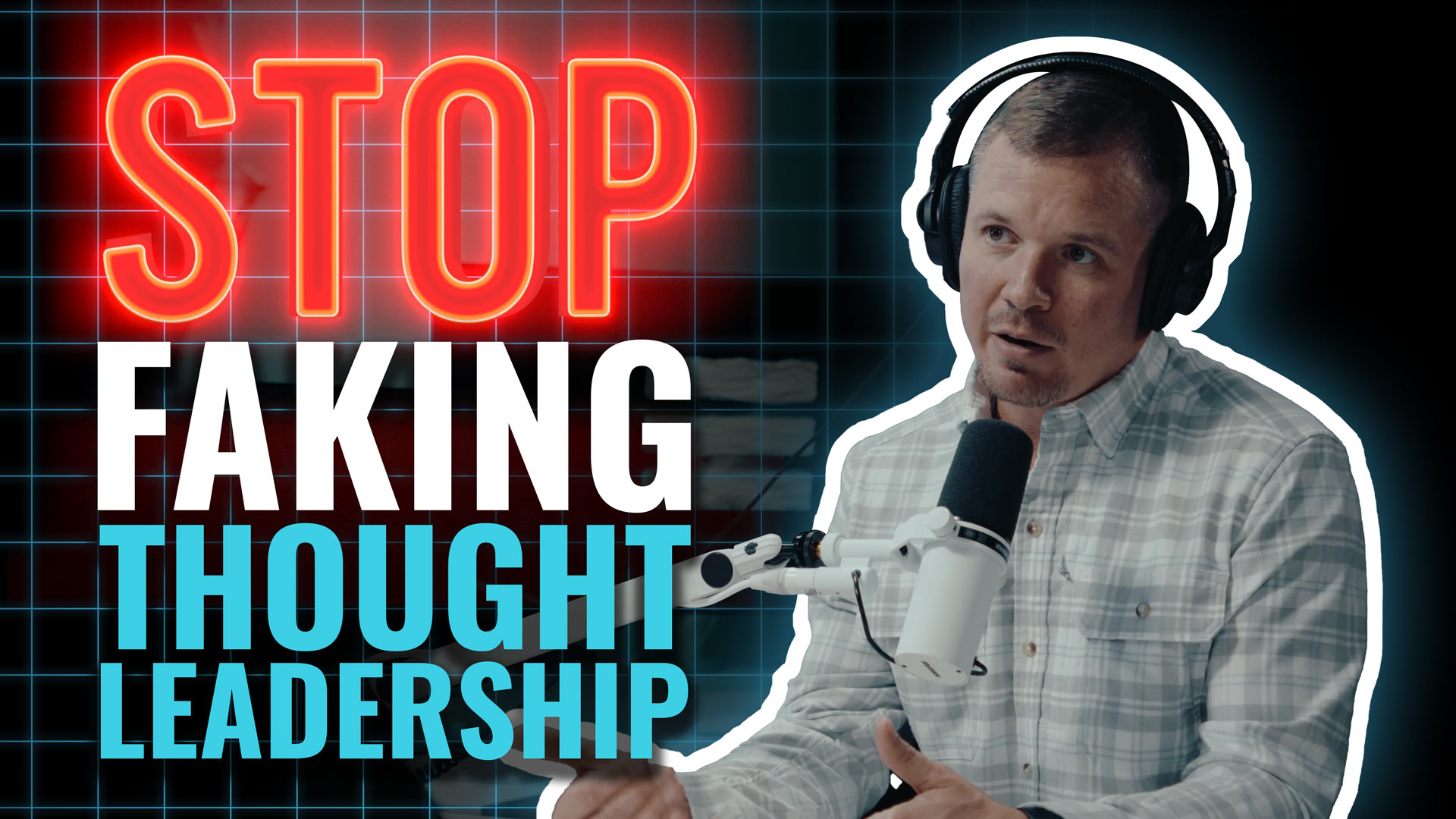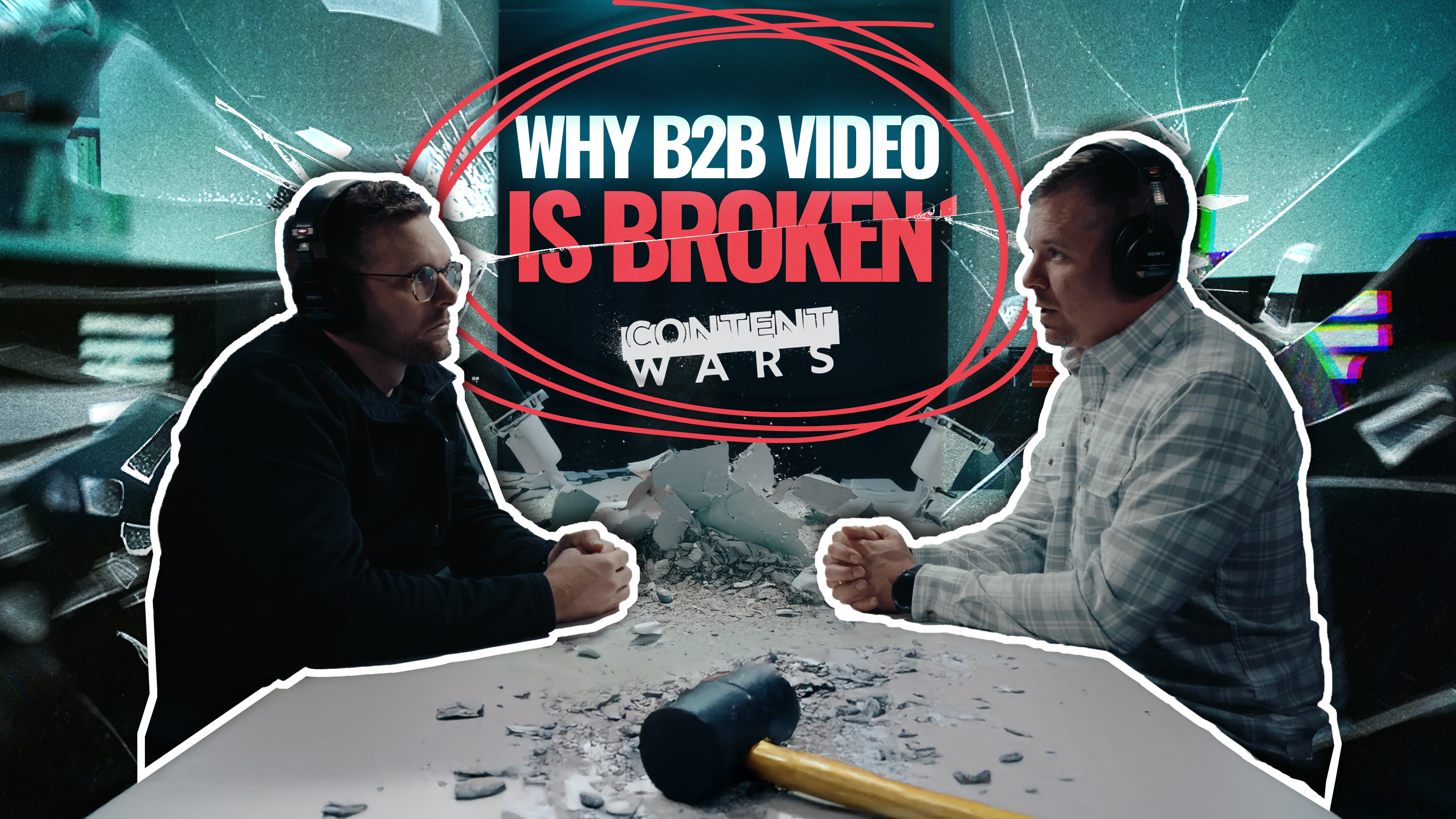
The B2B Podcast Myth: Don’t Get Burned – EP3 – Content Wars
In this episode of Content Wars, we break down the biggest misconception B2B teams have about podcasts—and how it's burning their content strategy.
Spoiler: the value of a podcast isn’t in the long-form—it’s in the short-form content gold it unlocks. If you’ve ever had leadership shoot down a podcast idea, this one’s for you.
💡 Key Takeaways:
➡️ Why B2B execs say “no” to podcasts (and why they’re wrong)
➡️ How short-form video—not the podcast itself—is the real goal
➡️ Why the best companies don’t overthink setup before hitting record
➡️ What to say to leadership when pitching a podcast
➡️ How podcasting helps executives become better communicators and build authority
⏰ Battle Highlights:
0:00 – Why B2B execs shut down podcast ideas
2:00 – The Joe Rogan misconception
4:15 – The real goal: short-form content
6:00 – Don’t overthink the podcast setup
8:00 – The crossroad: say yes or stay stuck
10:00 – How podcasts improve your communication over time
12:00 – Why storytelling trumps frameworks
14:00 – How to reposition podcasting to get leadership buy-in
#b2bmarketing #contentwars #thoughtleadership
Transcript
Adam Marquardt: The goal isn't the Joe Rogan show. The goal is short-form content.
Nathan Yerian: If you talk to them, they didn't even watch the fucking Joe Rogan show. They watched some clips of the Joe Rogan show on their Instagram and they were like, oh, well, I heard it's three hours long. I don't want to watch three hours, but I watched this clip and that clip and the other clip. And I have a general idea of what happened when he interviewed him or her. Therefore, I know what the Joe Rogan show is and I know that I don't wanna do that. So they watched short-form clips and still don't understand that that's the benefit of them doing that.
Adam Marquardt: What's the end goal?
Nathan Yerian: The end goal is there's a shit load of people right now sitting in fucking rooms being like, what kind of content should we create? Or should we create a pop music show? And there's a bunch of marketing teams saying, hey guys, I think we should create a fucking podcast. And there's a bunch of executives and other leaders in general that are saying, no, we don't want to create a podcast because we don't need a podcast. Far out, you don't need a podcast, but you do need content. And a podcast is the easy button for content. Ongoing content. Perpetual content. In general, short-form content. Video content. It is your one-stop shop for content. If that was the one thing you were gonna do, it's probably the most valuable thing you could do. But because they think it is a three-hour production, because they think that people have to go and subscribe and listen to this ongoing basis of episodes from them, they don't want to do it.
So what's the other way? You stop thinking about it. And especially if you're the subject matter expert, you're the person with expertise that they're putting in front of a microphone, stop thinking about what happens after you record. Because none of that has anything to do with you. Maybe you'll get some content that you can share on your social and that's great. That would be short-form content that you would get. What happens with the podcast or anything else doesn't matter.
It doesn't matter if a single person ever listens to the long-form episode. I think that they will. I think if you have short-form content coming out of long-form, people, the interested ones, will want to listen to the full episode potentially. There's been studies that have shown that as a strategy is probably a failing strategy. A lot of companies go in, they say, we're gonna make these short forms and then they're gonna lead to the long-form. I think it's a holdover for people marketing blogs. But that, at least as far as it can be tracked, generally fails as a strategy. But there will be people from the short-form that say, that's interesting, I want to hear more, and go and listen to the long-form. So there will be people that listen to long-form. If you do it long enough and you get good enough or your point of view is impactful enough, there will be people that go and listen to it. But you have to remove that goal away from why you're doing it. Why you're doing it is you need to communicate a message to an audience. If you're gonna do that, you have to be able to capture a message. And whether that's a podcast, a blog, a webinar, standing up on a soapbox and screaming in the middle of town square, some way you have to figure out how that happens. The podcast is probably the easiest way from a B2B context. So that when the marketing team says, hey, let's do a podcast, stop thinking about what happens next, what happens with the podcast, and who's gonna listen and what am I gonna say and what—it just, none of that really matters. What matters is you need to speak.
And the main goal, if you have one, should be short-form content. You're gonna take little sound bites—a 20 second thing here, a 15 second thing there, minute-thirty thing there—and those little sound bites are gonna be able to be packaged up into short-form content that can go on the company social or on your social, and the audience can consume that moment of brilliance coming from your mouth.
So if you rewind and think about it, when the marketing team says, hey guys, how would you feel about a podcast? What you should think is: "Hey, I could get short-form content that I could use on my LinkedIn, or I could use it on my YouTube, or I could use it on my social channel," whatever that happens to be, to promote my ideas, to build my authority, to build my audience, to condition people to think the way that I think, which are all precursors to people being willing to buy from me. That's what should be in the minds of B2B executives when it's suggested, how would you feel about a podcast? Not: well, is it on Spotify or Apple and how long is it and what's the name of the show and all the things that don't matter about a podcast to them.
Adam Marquardt: If them setting up the foundational things—the name, the platforms, where it's gonna be distributed, how it's gonna be utilized—skip that and just jump in and start recording something and improve from there. Because the goal is not a long-form episode. It is the short-form nuggets that come out of it.
Nathan Yerian: Reality: when it's an idea—"Should we do a podcast?" None of that matters. It doesn't matter the time, the topic, the location. Nothing matters. It's just a matter of whether you're gonna say yes or no. When the idea is, can we do a podcast, we're at a crossroad. Are we gonna go yes, or are we gonna go no? The executive team or executive that thinks about the name, the long-form, "Who's gonna listen?" or "Who's gonna watch?" or "How much time?" All these things—their answer is gonna be no. And as a result, they're not gonna have short-form content for themselves or for the company. The executive team or executive that says, "You know what, I'm open to that idea. And I don't give a shit if anyone listens to a full episode ever. But I know that I know some things. I know that I have expertise. I know that I have value that I could transfer to an audience on behalf of the company or myself. And I'm willing to get in front of a microphone and say things. And some short-form content will come out of that that will be valuable to our marketing. So therefore, yes. Yes, I'm willing to do that." And that's the smart move.
Adam Marquardt: When should somebody from the executive team say no to a podcast?
Nathan Yerian: That's a good question. I don't know when you would want to say no. I mean, the canned answer is gonna be if you don't have a unique point of view, or unique knowledge, or unique skill. But I think, you know, you might have a relatively small audience, but I think there's very few people that don't have something unique that they could talk about or share. Even if it's boring, even if it's a commodity market where you're just selling stuff just like the next guy and your supposed value is customer service, okay, that might not be that entertaining, but if you've been doing it for 20 years, I bet you got some fun stories about that commodity. I bet you've got some tales about back in the day. I'm sure you've got some ways that you've beaten the competition that you could talk about, some areas where you are different, even if it isn't in what you're selling. I think there's always something to talk about. It's just a matter of can you talk about it.
But maybe that's it. If you have someone that literally can't talk, I probably would not put them on a podcast. When you're talking to—and this is probably more for the executive and not for the marketing team, right? So if you are the marketing team and you're trying to get your executive team involved in a podcast or even just content creation that's an idea that you have, don't present it to them as a podcast without telling them our goal is to create a lot of short-form content.
You tell them that and it starts to open up the possibility of it happening. In my experience, and I've talked to a lot of executive teams about a podcast, it gets shut down almost immediately. There's some sort of like bad juju in the air around the word podcast or something. But if you say, hey, would you like to make some short-form content? Oh, now they're open to it. And the podcast might be just a vehicle to get there.
Adam Marquardt: That goes back to what you were saying earlier about the object is to communicate and transfer that belief to the listener, to the audience. And when you stray from the objective of creating a long-form piece of content, you just focus on, does this transfer something of knowledge to our audience? It's an easier thing to commit to.
Nathan Yerian: It's also an easier sell because they don't feel like they have to perform for however long—30 minutes, an hour, Joe Rogan's three hours. They don't feel like they have to perform for that long because many times they don't know what they're going to talk about. And guess what? When you have the idea of a podcast, you don't necessarily need to know what you're going to talk about in each episode yet. That's a cart before the horse, definitely. But you know, that's the feeling. Hey, we're going to need you to talk for an hour. And they're like, shit, I don't want to talk for an hour. What if I just say no? Tell them it's short-form and it's like, bro, could you give me 15 seconds or 30 seconds of something smart?
Well, yeah, yeah, that sounds like something I could do, right? It compartmentalizes it where it's not as daunting of a task. But the other thing, and I think it's more for the executive team or expert in general is, you know, the value for them. So obviously there's value for the company in getting content done. There can be value for them from the short-form asset being applied to their social channel, build their authority, their audience, whatever. But I think there's a more important aspect for them, which is the honing of their presentation, the honing of their message.
When you get the microphone and you get to speak into it, you are going to get better over time. Like if you listen to any notable person—we'll pick on Joe Rogan because we already have been. His first podcast episode is not going to sound like his last. He has a different style. He has a different comfort level. He has a different way that he approaches different guests and gets them to unpack what they're talking about that he did not have on day one. And when you are able to get the opportunity to sit in front of a microphone and talk about whatever the hell you want to talk about, however you want to talk about it, it opens up the options and you get a little freedom to say what you think, what you want to say. You get to experiment with things.
You get to try out different ways to pitch your value or your story and really see what works, especially if you're going back and listening to yourself later. I mean, I do that all the time. And just, you know, what did I say? How could I have said it?
Or the big one: why, why am I not shutting up? I mean, seriously, I'll go from topic to topic to topic and not even take a breath.
And then I'll have a purposeful pause because I know that I do that. So it improves just my communication ability doing this. So I think from the executive standpoint or that leader standpoint or whatever you want to call them, it isn't just that you can get some short-form content. You can build, you know, kind of your personal brand or whatever you want to call it. It's also that you can become a better communicator. You can become a better professional. Whatever your profession is, you can become a better professional by doing so.
Adam Marquardt: I know that from talking to some of our clients, they've had those same questions of like, how do I start? What do I talk about? Thinking that they have to, you know, go really deep on a certain topic or subject. And while that's important and valuable, it's also interesting when we are able to get out of them the experiences that they're going through and being able to share, you know, oh, well, just last week, you know, we were talking to client ABC and they were going through this and here's how we navigated that. Here's how we helped them solve that. And being able to tell those stories like you talked about. I think there's a really big missed opportunity in that where everybody thinks that they have to have this PhD-like approach to a podcast where they're revealing some new framework or methodology. And I think there's so much value in sharing the stories or the experiences that you as a professional are going through—as long as, you know, it passes the HR check. But realistically, just being able to share kind of one or multiple of those different angles of things that you're seeing on a regular basis and then how you're overcoming that or tackling that.
Nathan Yerian: Yeah, I think the experience comes from two different levels. There's either historical experience of, hey, I have this knowledge and now I'm going to teach it to you, or it could be a more recent experience where maybe all the learnings haven't happened yet, but hey, this is what's happening on the ground right now. And you kind of learn as it happens, right? Kind of a walk with me while we go do whatever it is. So there's really two different approaches. You definitely don't have to have the PhD to be able to speak about what your experience is. And I think there's a lot of professionals that have experience. They have the expertise from their past. And they're also going through things on a daily basis that are in their customer's market that they can talk about.
And what many don't take into account is that they are a connector. So they talk to more customers who look like any individual customer that they have, than their customers do. So, hey, you might have a customer that does whatever, we'll say they do video content, right? It's more likely that if your customer is a video company, that you talk to more video companies than that video company does. So when you're talking about a problem with a certain, in this case, video company, and you're talking about what it is, how it happened, how you're trying to help them get through it or get over it—well, guess what? That probably applies to your other potential customers as well. So you're able to take a learning that you found or experience you had in one instance and turn it into something that could be valuable for a wider audience.
So I think we kind of took this in a slightly different direction. But at the end of the day, the reality is it's been my experience that B2B companies, especially whoever you would want to be on the mic, tends to shut down the idea of a podcast, which is probably a bad move—especially for teams that are trying to create content. And if you approach it from a slightly different angle, instead of, you know, the "Hey, let's do a podcast," and you do it as the, "Hey, how do you guys feel about creating short-form content?" Usually the executive team is more open to the conversation. And you can get a little bit further and potentially get a yes, versus just saying, "Hey, let's start a podcast."



